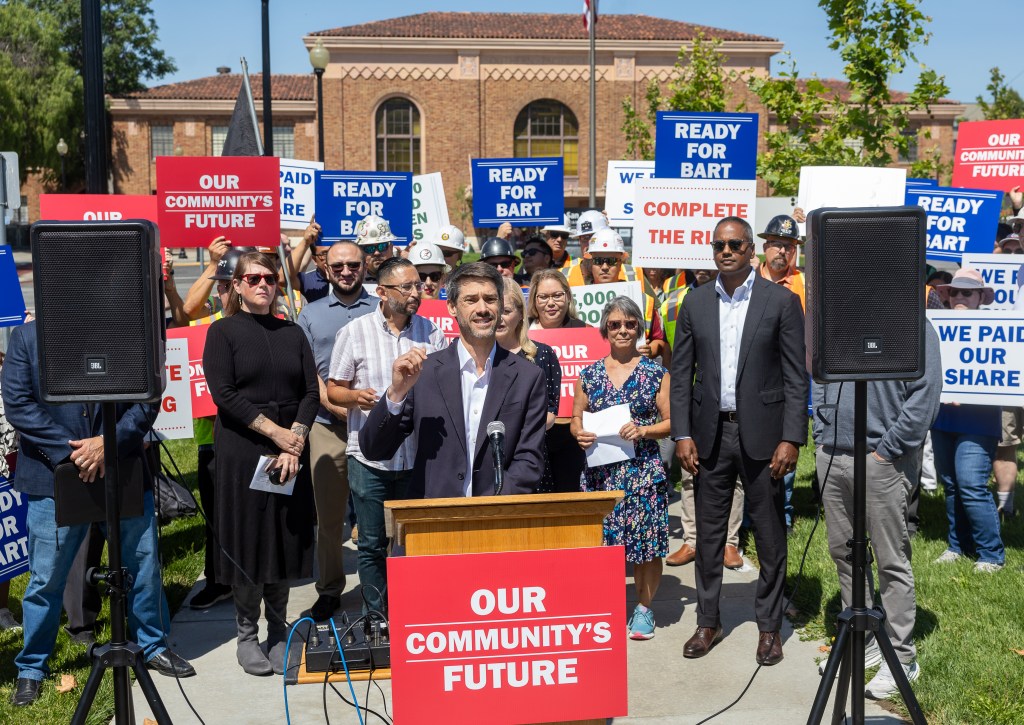San Jose Mayor Matt Mahan speaks to local business leaders at a media event at the Diridon Station in San Jose, California, to ask for federal funding to complete the long-promised BART extension, Tuesday, July 9, 2024. (Carl Mondon/Bay Area News Group)
A coalition representing hundreds of businesses released a letter to U.S. Secretary of Transportation Pete Buttigieg on Tuesday urging the federal government to quickly spend more than $6 billion to build BART in downtown San Jose and the city of Santa Clara, which would be the largest single public infrastructure project ever proposed in Santa Clara County.
“This project is critical to our region's infrastructure and economic growth and is supported by significant local and state funding,” wrote Ahmad Thomas, CEO of the Silicon Valley Leadership Group, which represents companies in the region including Kaiser, Airbnb and the San Jose Sharks, and which includes the Bay Area News Group.
Silicon Valley leaders say the continuation of the second phase of the Silicon Valley BART Line is crucial because 35 percent of the Bay Area's future job and population growth is expected to happen in the region, according to Plan Bay Area 2050, a 30-year strategic plan developed by the Metropolitan Transportation Commission that focuses on the environment, transportation, housing and the economy.
The first phase of the BART extension will bring service from Alameda County to Santa Clara County, with stops in Milpitas and North San Jose opening in 2020.
Crews broke ground on the next phase of the expansion project last month and the area is ready to begin construction, but construction can't begin until federal funding is secured.
“Voters paid their taxes because they really wanted BART to be here, and now we need the support of the Biden Administration and the Federal Transit Administration,” Santa Clara County Supervisor Cindy Chavez said at a press conference Tuesday. “We urge them to work with us. We have to include federal funding in order for this project to move forward.”
Over the past 20 years, Santa Clara County taxpayers have contributed more than $4.6 billion in local tax dollars to the project, and the state has provided an additional $1.9 billion. The Santa Clara Valley Transportation Authority (VTA) is designing and constructing the South Bay Extension. BART will operate and maintain the line.
The FTA is expected to decide how much to award in the coming weeks, but the internal report outlines a number of concerns and risks associated with the project, including the controversial decision to go with a single-hole tunnel design instead of the traditional two-hole tunnel design.
In its report, the federal government raised several concerns that could further complicate matters, including a higher inflation rate for transportation projects in California than the national average and a lack of a clear plan for the $2.7 billion contingency fund the VTA has set aside in case something goes wrong.
“We are in intense discussions with the Federal Transit Administration and are fighting to secure every available funding for this project,” the VTA said in a statement.
The cost of the six-mile, four-station BART extension, which would run from the Berry Transit Center in North San Jose through downtown to Santa Clara, has soared from $4.4 billion to $12.75 billion over the past decade. It was originally scheduled to begin service in 2026, but the opening date has been pushed back to 2037. Officials say the extension will serve 55,000 passengers a day from BART to Silicon Valley by 2040. Chavez said the extension would also create 75,000 jobs for union members.
San Jose Mayor Matt Mahan said the BART extension will benefit future generations.
“Bringing BART through Silicon Valley isn't just about the costs today, it's about the opportunities we'll create tomorrow. It's proof that Americans are still capable of great things. We can sacrifice for the benefit and opportunity of future generations,” Mahan said. “This is for our children, our grandchildren and our great-grandchildren.”
Mahan said having the opportunity to use public transportation was life-changing for him, as he lived in a rental property and didn't have a car while going to school and getting a job.
“Without the Highway 17 Express bus, I would not have been able to access a great, quality education with a scholarship that allowed me to work and study at the same time,” he said. “Without Caltrain, which people built six generations ago, I would not have been able to start a business and commute from San Jose to the Peninsula. Transit has changed my life.”
Staff writer Grace Haas contributed to this report.

